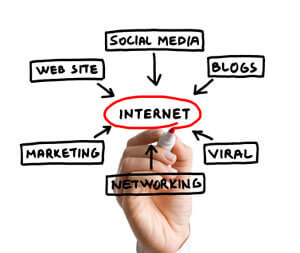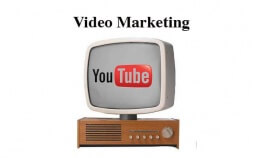Marketing at it’s very essence is the matching of buyers with sellers. In order to accomplish this, you have to effectively communicate your business’ products and services to potential customers through the features and benefits uniquely presented by your company. As valuable as marketing is, it can be a challenge to reach your ideal consumer.
Ok, that was a pretty boring explanation, right? The real question is, “how do I market my business online to those looking for my products or services?” I’m glad you asked!
How to Get Your Business Found Online
Traditional marketing broadcasts your message with a “shotgun” based approach, distributing it to many people across a wide array of mediums, but is only applicable to a small percentage of these. Because of this, traditional marketing is expensive and hard to measure. However, with a solid web presence, social media, search engine optimization, content marketing, and local search marketing campaigns, it is now possible for your business to target and get found by those who are actively looking for what you have to offer.
Online, location-based marketing, along with demographic targeting, is the secret. In order to attract targeted customers who are looking for your products and services, there are several steps that every business should take:
Business Website
Your company’s website is your home base on the internet. If you don’t have an attractive, professional, easy to navigate, and search engine optimized website, all your other online efforts will be largely superfluous. Unless you’re in the fashion or design industry, you probably don’t need a $5,000 – $10,000 flash-based graphically designed site. Your website should be results driven, not accolades driven. If you have the best-looking site around, but no one can find it, what good is it doing your business (other than feeding your ego)? The main pages of your site should be home, products/services, about, contact, and hopefully a blog.
Local Search Listings
Is your business showing up in Google Places/Maps, Yahoo Local, & Bing Local? These are typically the first results that display when a potential customer is searching online for your specific product, service, niche or industry. 98% of searches stop on page one. If you’re not there, you don’t exist. Google IS the yellowpage killer. Yellowpages use is down over 55% since 1999, and growing. 82% of local searches result in an in-store visit, phone call, or purchase. If you haven’t added/claimed your business to these local listings yet then stop reading this and do it now! Get listed, get found, get new customers. Simple as that. P.S. You can download our free guide to Google Places on our Facebook page.
Social Media
Facebook, Twitter, YouTube, LinkedIn. Everyone is using these social media tools, both personally and professionally. In the new social economy, if you don’t have a presence there, you’re losing business. However, quality is better than quantity. Don’t just set up a profile for your business on every social network out there and then not use them. Pick and choose which ones you can realistically use on a consistent basis and stick with it. If you plan to tweet once a day, then do it. This is much better than 5 times in one day, once a week. Interject your personality into your social media interactions. Be human, not robotic or corporately boring. Customers like to buy from businesses they find interesting, not boring. Set yourself apart from the crowd by being different. But remember, social media is not a one-way street. Don’t just broadcast your message. Communicate with your followers. It’s a conversation, not a monologue.
Local Directories & Review Sites
A good majority of internet users will research a business before making a purchase there. Most of this research will be conducted online. There are hundreds of local business directories and review sites that your business can be listed in. Claim your listings. Optimize them with your contact info, website(s), social media accounts, and keywords potential customers will be searching for. Whenever you get a new customer, encourage him to leave a review on your business at one of these sites. Some of the most popular are Yelp, Merchant Circle, Best of the Web, Kudzu, Insider Pages, Angie’s List, and many more. If you’re in business, it’s inevitable that you will get a negative review from time to time. The two worst things you can do when this happens is to ignore it, or delete it. Be proactive. Address the complaint and attempt to make it right. Go out of your way to satisfy the disgruntled customer. Not only are you providing top-notch customer service, you are setting yourself head and shoulders apart from your competition. Reputation management is the key. Set up a Google alert to email you whenever your business is mentioned online. Pro-activity is the best policy.
Blogging
Search engines love blogs, but that is only a minor reason why you should be business blogging. A business weblog should be more personal and slightly less straight-laced than the rest of your website. This is a great opportunity to say what you’re really thinking, without the constraints of sounding “corporate” or overly “salesy.” It’s extremely important for a genuine personality to shine through; this is what will attract people to your blog. If not, it won’t be read, is a waste of time, and can be seen as hypocritical. Transparency is a good thing. It makes the business/writer seem more “real.” And people like to do business with REAL people, not just some company out there on the web. There are many ways to blog. Traditional text writing, video blogging, and audio podcasting are all effective ways to engage your readers (viewers, listeners) and help your business gain more exposure. The more you blog, the more likely your content will get picked up and distributed across the web, allowing more people to come in contact with your business. You can’t put a price tag on free, viral marketing!
Email Marketing
It’s a lot easier and cheaper to get a past customer to buy from you again (assuming they liked what they got the first time) than it is to get a new customer. Any time you make a new sale, you should be collecting your new customers contact info, specifically, email address (and cell phone number, if possible). You have to stay in contact with your customers. That way, you’re at the forefront of their mind when the need arises for your product or service. Don’t spam. Don’t just be selling. Email them a birthday card. Tell them something of interest in your industry. Provide them with valuable, free information that will make them think of you when they need your product/service offerings. This doesn’t need to take much time. Many of these emails can be set up to go out at a predetermined time. A reputable email auto-responder is essential! Aweber is a fantastic one. Having a newsletter sign-up form on your website can help with this. Give more than you take. There has to be some incentive for the customer to part with their valuable contact info. Give them a reason to.
Video Marketing
If a picture is worth a thousand words, what is a video worth? YouTube is the second most used search engine after Google. If you’re not using online video to promote your business and engage with potential, current, and past customers, you’re neglecting a huge opportunity. It doesn’t have to be expensive. A $100 FlipCam and basic movie editing software that comes with most computers is all it takes. Testimonials, interviews, business introductions, helpful tips and suggestions, these are all fantastic topics to cover with video. Put them on your website, Google Places page, social media accounts, online directories, and video sharing sites. These will all help your message to get in front of the maximum number of viewers. Be sure to optimize the title of the video with a specific keyword phrase, and the video description with your company website, name, and description of the video.
Pay-Per-Click Ads
If you want to place yourself in front of customers who are activity searching for your product or service right now, pay-per-click is the way to go. You create an ad about your business, set it to only show up if someone is searching for a specific keyword or phrase, and you only pay when someone clicks your ad. The beauty of this system is how specific you can target the ads based upon demographics and geographics. Based upon the web searcher’s IP address, Google knows where they are located, what they searched for previously, and many other useful criteria. If using Facebook ads, there is even more demographic data that can be used, such as age, sex, and multiple interests. If you’re not using search engine marketing or pay-per-click, you should be.
OK. There you have it. The top steps to take to get your business found online. Got questions or suggestions? Leave them in the comments below!



Video Marketing is one of the fastest and most effective forms of marketing and Local SEO online.
Yes it is! How are using video marketing in your business, Perry?